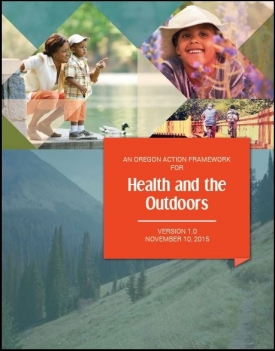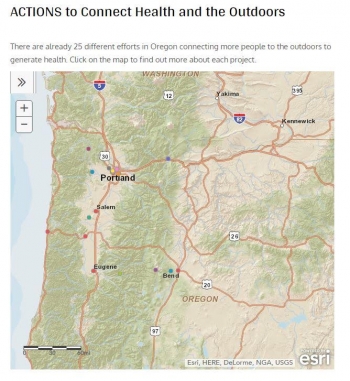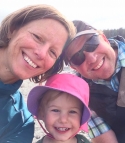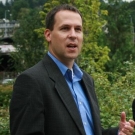Improving health by spending time outdoors
By Katie McClure and Bobby Cochran, November 18 2015
Oregon is currently ranked 27th in the nation in overall well-being.
As Oregonians, we all strive for better.
Toward this end, hundreds gathered at the Oregon Healthiest State Summit at Revolution Hall in Portland last Tuesday to develop a shared understanding of our current state of health and to better coordinate efforts to improve it. Businesses, schools, and public and community agencies learned from each others’ efforts and created plans to work together to more quickly achieve the desired improvements.
A strong message throughout the day was the need for health equity; African Americans, American Indians and other underserved communities do not have the necessary built and social infrastructures to make healthy choices easy. We heard loud and clear that to make a real difference, these communities need to be supported in their efforts.
 The "Health and Outdoors" breakout session was standing-room only, clearly indicating that the idea of building communities where more people get outside more often is compelling. The Oregon Action Framework for Health and the Outdoors -- just launched by the Oregon Public Health Institute, Willamette Partnership, Portland State University’s Institute for Sustainable Solutions, Solid Ground Consulting and The Intertwine Alliance -- will provide direct support for communities to reduce the barriers that prevent people from spending more time outdoors.
The "Health and Outdoors" breakout session was standing-room only, clearly indicating that the idea of building communities where more people get outside more often is compelling. The Oregon Action Framework for Health and the Outdoors -- just launched by the Oregon Public Health Institute, Willamette Partnership, Portland State University’s Institute for Sustainable Solutions, Solid Ground Consulting and The Intertwine Alliance -- will provide direct support for communities to reduce the barriers that prevent people from spending more time outdoors.
The framework calls for more research and communications about the health benefits of nature, along with public policies that support health and the outdoors. And it calls for a focus on communities experiencing disparities. Coordinating our efforts in these areas will allow us to have a greater impact on the health of all.
Did you know that a simple walk through a neighborhood with lots of trees can help calm your mind? Have you ever wondered what it’s like for those who live in neighborhoods with few trees? Did you know that the number of people going out to fish or hunt has been declining over the years, even as we are learning more about the power and importance of experiences that connect us to nature and inspire awe? And that spending time in groups outdoors can build the relationships that promote health?
There is evidence that bringing people outdoors, and the outdoors closer to people:
- Increases physical activity
- Reduces stress
- Fosters community and social relationships
- Improves air quality
…all of which improves human health. But not everyone in Oregon has access to outdoor activities and places, which means that not everyone gets these health benefits.
Basic ideas for action
Communities – especially those experiencing disparities – will create projects that address their own health and outdoors priorities. A core team and partners support this work by:
- Raising funds and making grants to the community projects
- Supporting aligned policy efforts at various levels
- Developing and implementing a strategic research agenda
- Providing evaluation support and communication tools
What kinds of projects are we talking about?
Action Framework partners are looking for projects that seek to improve physical health, behavioral health and mental health, and strengthen social cohesion. We are especially looking for new ideas, or strategies for scaling and strengthening existing ones that:
- Address barriers to spending time outdoors
- Increase parks, trails and trees
- Increase access to safe green space
- Activate and scale programs to get people outdoors
 What do we need to do to make this happen?
What do we need to do to make this happen?
Most importantly, we need a whole lot of people working together! Energy is building, and we need your help, too. REI is building from its Opt Outside campaign and committing to support community grants and to participate in developing a policy playbook. Portland State University and the U.S. Forest Service will begin working on a regional research agenda to build the evidence for health and the outdoors. The Kelley Family Foundation is supporting the core functions of the Action Framework: communication, coordination, research and policy.
Want to know how you can help?
- Pledge to get yourself and your family outside today at oregon.healthandoutdoors.org.
- Send us your ideas.
- Give $50 to get more people outdoors. (We are already halfway to our goal of $100,000 by January.)
- Stay in touch as action moves forward.
- Acknowledge and help to eliminate discrimination that causes communities of color to feel unwelcome in the outdoors.
- Help us build connections, and learn from each other’s work. Tell us about great work you see happening to strengthen the health and outdoors connection in Oregon and beyond, and talk to your local hospital, public health department, outdoor recreation group, school and everyone else about ways they can help get more people outdoors.
- Are you a corporate or healthcare industry organization interested in supporting this work? Contact Bobby Cochran at cochran@willamettepartnership.org to discuss options.

 As the executive director of Oregon Healthiest State, Katie McClure is committed to inspiring and engaging Oregonians to make system and environmental changes that make it easier for all to adopt and sustain a healthy lifestyle. Katie has also worked as the executive director of community programs for the Blue Zones Project by Healthways, where she launched and oversaw the implementation of local community transformation projects with meaningful results, such as a 40 percent reduction in the cost of care for employees, a 14 percent reduction in obesity, and a 30 percent reduction in smoking communitywide. Before that, she spent 20 years in education, social service, upstream health, and healthcare not-for-profits, including 10 years with Kaiser Permanente in Portland. Katie enjoys the mountains in Central Oregon with her husband Craig and daughter Elliot.
As the executive director of Oregon Healthiest State, Katie McClure is committed to inspiring and engaging Oregonians to make system and environmental changes that make it easier for all to adopt and sustain a healthy lifestyle. Katie has also worked as the executive director of community programs for the Blue Zones Project by Healthways, where she launched and oversaw the implementation of local community transformation projects with meaningful results, such as a 40 percent reduction in the cost of care for employees, a 14 percent reduction in obesity, and a 30 percent reduction in smoking communitywide. Before that, she spent 20 years in education, social service, upstream health, and healthcare not-for-profits, including 10 years with Kaiser Permanente in Portland. Katie enjoys the mountains in Central Oregon with her husband Craig and daughter Elliot. Bobby Cochran is the executive director of the Willamette Partnership, a nonprofit coalition of business, environmental and other leaders working to enhance the pace, scope and effectiveness of restoration in the Northwest. It specializes in the design and operation of emerging markets for ecosystem services. Bobby has worked on market-based policies for environmental organizations, a water utility, and international efforts. He received a Ph.D./M.A. in urban studies/conflict resolution from Portland State University, and his Masters in Public Policy from the University of Southern California.
Bobby Cochran is the executive director of the Willamette Partnership, a nonprofit coalition of business, environmental and other leaders working to enhance the pace, scope and effectiveness of restoration in the Northwest. It specializes in the design and operation of emerging markets for ecosystem services. Bobby has worked on market-based policies for environmental organizations, a water utility, and international efforts. He received a Ph.D./M.A. in urban studies/conflict resolution from Portland State University, and his Masters in Public Policy from the University of Southern California.
Comments
Nature and Good Health
Add new comment